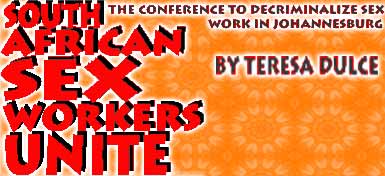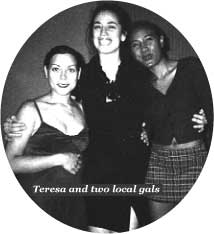|

In
the middle of February I got to go to South Africa  for
a few days. Total trip, right. How many times do you get
that offer? There was to be a sex workers conference near
the big city, Johannesburg, and the topic was on decriminalizing
prostitution. Carol Leigh from COYOTE in San Francisco,
and Sharon Mitchell from AIM in Los Angeles were invited,
too. Carol also uses the name Scarlot Harlot, and invented
the term "sex work" in the 70s. She's a big 'n
beautiful sex working activist since forever. And Sharon
Mitchell may for
a few days. Total trip, right. How many times do you get
that offer? There was to be a sex workers conference near
the big city, Johannesburg, and the topic was on decriminalizing
prostitution. Carol Leigh from COYOTE in San Francisco,
and Sharon Mitchell from AIM in Los Angeles were invited,
too. Carol also uses the name Scarlot Harlot, and invented
the term "sex work" in the 70s. She's a big 'n
beautiful sex working activist since forever. And Sharon
Mitchell may
ring a bell 'cause she has performed in adult cinema the
last two decades and still looks fucking great. Miss Mitchell
founded the Adult Industry Medical health clinic in '98,
reminding porn actors and filmmakers about STD prevention
and emotional well being. Then there was me, founder and
director of Danzine, a publication and non-profit
outreach staffed by and directed at people in the 'biz.
"We
already know about AIDS; what we need is the police to stop
harassing us!" they said.
I found out about the conference one week before the plane
took off and had to get an "emergency" passport
in Seattle. It takes a few days getting to South Africa
and coming home sends you back in time. I drank duty-free
Jim Beam on the way over, sleeping through tomorrow’s
time zones. A crazy doctor picked me up from the airport.
Her name was Dr. Elna, and she has been running a health
clinic out of her home since 1983. She talked fast and ran
through red lights; her curly hair did what whatever it
wanted to. I liked
her from the get’. It's a funny thing seeing someone
white say they're African. Lucky for me plenty of people
spoke English, but I was the one with the accent. The conference
was held at a resort thirty minutes from Johannesburg (Jo-burg
as the locals say), and Dr. Elna took me there, rattling
off the rapid sociopolitical changes in her home country.
In 1994, South Africa shit-canned Apartheid and went for
a Democracy. In 1996, abortion became legal. Meanwhile,
stuff like HIV/AIDS has swelled into a big problem, bringing
us to February 2001.
The National Department of Health held the "South African
Conference on Adult Commercial Sex Work.” I've heard
the term "sex work" cover different fields (stripping,
phone sex, domination, private shows, etc.), but for the
purpose of this conference, sex work means sex for trade.
Presently, prostitution is illegal. South African law says
that it is a crime to have sex or perform sexual acts for
a reward. A 'reward' can include money,
clothes, or anything else that the sex worker receives in
return for sex.
To Legalize: This means sex work is legal, as long as it
is done under certain conditions. Anyone doing sex work
outside these conditions can still be punished.
To Decriminalize: This means that all laws which say that
it is a crime for adults to engage in sex work are scrapped.
In an opening address, the Minister of Health stated she
supported the move to decriminalize prostitution. The purpose
of this conference was to supply the Minister a document
of recommendations from health care providers, non-governmental
organizations (NGOs) and sex workers so she could lend input
to the Department of Justice. You see, if prostitution is
illegal, the Health Department can't change a law per se.
But if the illegal aspects are affecting the community's
health (and it is), then the Health Department
can suggest Law Reform as a viable solution.
The Conference:
There were about 100 people in attendance, some health care
providers, government ties, NGOs, and local sex workers.
Doctor/Research types from India, Cambodia, Australia, Senegal,
and Thailand presented how decriminalizing, legalizing,
and tolerating prostitution worked for them. Good information...my
brain was overloaded on how other countries approached and
enforced the situation. There's too much data to drop her,
but I will say
this: There are other places on this globe where trading
sex for something was not considered criminal...
and the sky did not fall.
What the conference tried to make some sense of:
 1.The
difference between decriminalizing prostitution vs. legalizing
it. 1.The
difference between decriminalizing prostitution vs. legalizing
it.
2. Learning from other countries that have instigated Law
Reform; those realities included: Do you make sex workers
register, or does that just shove the underserved more underground?
Is mandatory HIV testing necessary? (Unconstitutional, according
to the new South African government). And what to do if
a good percentage of the general population is already HIV
positive? If you recognize sex work as real work, then do
Labor codes go into affect? What about trafficking—moving
sex workers between provinces and countries? If your community
has decriminalized prostitution, what to do about the bad
people bringing in unsuspecting or unwilling workers under
that umbrella? And finally, the point of decriminalizing
is the health and safety of the sex worker, not the convenience
of government bureaucrats.
3. The conference addressed underage sex workers, but they
pointed out that topic is another conference; they were
addressing adults only today.
"The
HIV epidemic was hidden from us, and now it is killing people.
We were told it was a gay disease. We should stop hiding
the truth because keeping things hidden kills people."
The first evening of the conference, the U.S. sex workers
asked local working girls if they wanted to have an impromptu
meeting just to swap shop talk. This was the most interesting
part of the Conference to me, so...here’s what they
had to say.
The local workers were pissed 'cause they said it was a
conference about sex work, but the whole first day was about
HIV/AIDS. The girls (and a few boys) believed they were
being blamed for the epidemic. "We already know about
AIDS; what we need is the police to stop harassing us!"
they said. What the local workers wanted was prostitution
to be decriminalized 'cause the police rape, rob, and beat
up pros. It's pissing them off. "Our rapists are the
government police," one told us. Another uncanny detail:
the voices of each worker I spoke with sounded familiar,
kind of like the women I've worked with in the US and the
UK (same stories, different accents).
a) One gal was a single parent, working the streets for
13 years. No formal education, but has learned some Chinese
and Portuguese so she can negotiate with her clients. "It's
cold standing out on the corner all night!" She said
nobody can tell her what to do with her body, and if a customer
doesn't want to use a condom, she tells him to fuck off.
b) A "high-grade" escort spoke of working for
an agency. She’s in college. Her boss tells her,’
if you don't like how I do things, then go work somewhere
else.’
c) A lady worked in a mining community. "We work in
the bushes, behind the big rocks. We tell the men they need
to use condoms, but some of them are stubborn. I tell them,
‘No condom, No sex.’" (this was translated
from Zulu.)
d) A student, who is getting her degree in Public Relations,
has been working as an escort for one year. "Someone
at this conference asked me what was I complaining about,
he didn't make XXX$ a job!"
e) One lady worked out of a hotel. The hotel owner isn't
a manager or her pimp, but he know's what is going on. Prices
for her services are too low, and security is weak. Her
friend got killed by a customer in one of the rooms not
too long ago.
f) Another sex worker was mad because there are others that
are having sex without condoms, making it harder for her
to insist on latex with customers. She believes this instigates
violence from the men. She also said the nearby neighborhood,
including the children, make fun of her and harass her when
she walks by.
And the list goes on. Any of this sound familiar? Common
themes: police harassment, stigma, and the local workers
want help in organizing. Also, the women are concerned for
their children and dependents.
I think what the U.S. sex workers did was help the locals
organize. The locals have a lot to say, but how do you run
an efficient meeting where everybody can list their needs,
and, in several languages no less? We made a record of what
each person wanted, then Carol Leigh set up her lap top
computer in the bar. We all partied and passed the bottle
while typing up the local's rant. By 9:00 A.M. the next
day, the PR escort made an announcement to the room: "We
have something to say." She read off the document now
referred to as "Sex Workers Speak Out;” that totally
changed the tone of the Conference.
Here’s a few of things that the locals said:
"We came thinking we would talk about making improvements,
but we are
only talking about HIV/AIDS.”
"We need men to take responsibility. People always
point to the sex workers to take responsibility."
"NGOs use sex workers to get funding; we need to be
recognized as experts in our field, and to be compensated
for our labor and assistance."
"We need safety."
"Stop the harassment."
"Police rape and rob us."
"The HIV epidemic was hidden from us, and now it is
killing people. We were told it was a gay disease. We should
stop hiding the truth because keeping things hidden kills
people."
Now that's what I call ownership.
IN CONCLUSION:
The people attending the conference
meant well; I left the
conference thinking this decrim-thing will be a reality
in South Africa within the next three years. Policy making
with the Health Department is in effect. The idea of incorporating
human rights, community health and law reform was most apparent.
Conference Chair Professor Helen Rees tells me, "Things
are happening really fast." I’ll say. But it never
seems fast enough.

|
|





